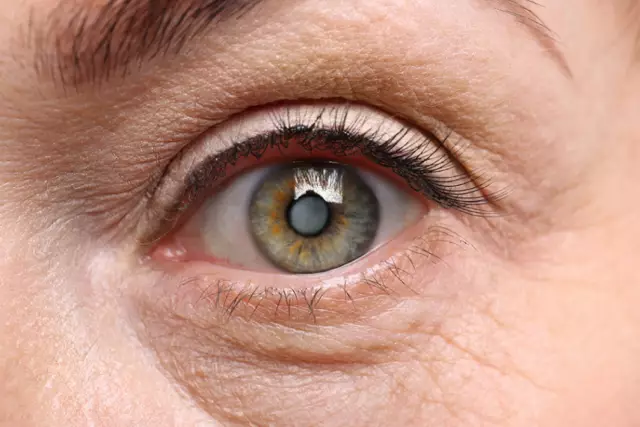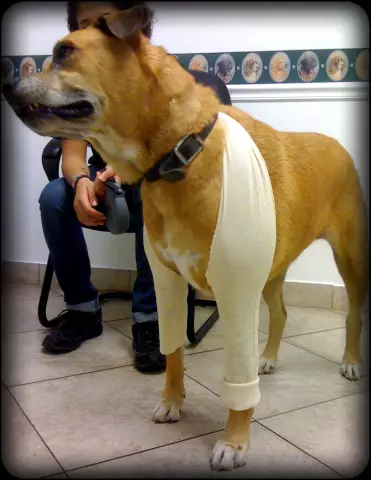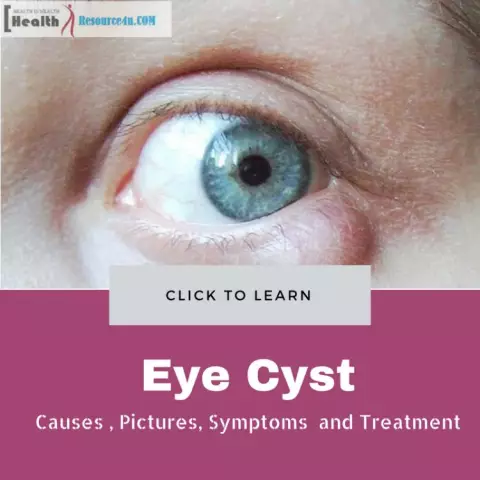- Author Rachel Wainwright [email protected].
- Public 2023-12-15 07:39.
- Last modified 2025-11-02 20:14.
Cataract

Cataract is a clouding of the lens, which leads to a decrease in vision, and in some cases to its complete loss. This disease is the most common cause of blindness, which is treated with medication, and in advanced forms, cataract surgery is performed.
Cataracts of the eye are caused by biological aging, exposure to radiation or certain diseases (diabetes mellitus). The development of lens opacity leads to the appearance or intensification of myopia, which improves near vision and deteriorates distance vision.
Cataracts can be partial or complete, stationary or progressive, hard or soft. The main types of age-related cataracts are nuclear sclerosis, cortical cataracts and posterior capsular cataracts of the eyes.
For the first time, cataract removal was carried out 2 centuries ago by the surgeon Jacques Daviel.
Cataract symptoms
Cataract symptoms are different and depend on the type of cataract. The most common cataract symptoms are:
- Loss of ability to distinguish colors;
- A sharp decrease in vision;
- Glare in the eyes;
- Loss of the ability to read or write without glasses;
- Staining the pupil white (with swelling cataracts);
- Increased or decreased photosensitivity.
Causes of cataracts
The most common cause of cataracts is age. Lens protein denaturation degrades over time, and this process is accelerated by diseases such as diabetes and hypertension. Over time, environmental factors, including light, toxins and radiation, tend to build up. These factors exacerbate the loss of defense and repair mechanisms due to changes in gene expression and chemical processes in the eyes.
Ultraviolet radiation and microwaves can also cause cataracts. Medications such as corticosteroids, quetiapine, and antipsychotic medications are responsible for the onset and development of eye cataracts.
Cigarette smoking leads to a twofold increase in the rate of nuclear cataract and to a sclerotic threefold increase in the posterior subcapsular cataract.
Various diseases can cause cataracts, including:
- Iodine deficiency;
- Metabolic disorders;
- Aminoaciduria or Lowe's syndrome;
- Diabetes;
- Fabry disease;
- Galactosemia;
- Homocystinuria;
- Hyperparathyroidism
- Hypoparathyroidism;
- Hypervitaminosis D;
- Hypothyroidism;
- Wilson-Konovalov's disease;
- Congenital syphilis;
- Rubella;
- Leprosy;
- Onchocerciasis;
- Toxoplasmosis;
- Chicken pox;
- Aniridium;
- Uveitis;
- Retinitis pigmentosa.
Cataract treatment

Cataract surgery begins with eye anesthesia, either by injection or simple eye drops.
Surgical treatment of cataracts can be carried out by the following methods:
- Extracapsular cataract extraction;
- Laser phacoemulsification;
- Intracapsular cataract extraction;
- Ultrasonic phacoemulsification.
The postoperative recovery period (the period after cataract removal), as a rule, does not last long. After the operation, it is recommended to avoid sudden movements and strains for a month.
Retinal detachment and endophthalmitis are serious complications after cataract removal. In both cases, there is a sudden decrease in vision, accompanied by pain. Retinal detachments often present with a unilateral visual field defect, a veil in front of the eyes, flashes of light, or floating spots.
Medicinal removal of cataracts is possible in the early stages of the disease and is carried out with the help of such medicines as:
- Vitafacol;
- Vitayodurol tyfosadenin;
- Izodibut;
- Katahrom Oftan;
- Quinax;
- Sencatalin;
- Taufon.
YouTube video related to the article:
The information is generalized and provided for informational purposes only. At the first sign of illness, see your doctor. Self-medication is hazardous to health!






